What We Measure
What We Measure

9 Key Performance Indicators
Your Teamlytica report gives you and your team a breakdown of each of the major nine categories within the report. All are colour-coded for ease of use.
The nine categories we score against are based on acknowledged academic, management and team diagnostics. Each question is carefully worded to ensure it can be answered by anyone completing the survey.
Each question is answered via a sliding scale of 1-10 – from ‘Never’ to ‘Always’. Each of the questions and categories are interlinked and interdependent and produce a clear and thorough diagnosis of where the team is ‘at’.

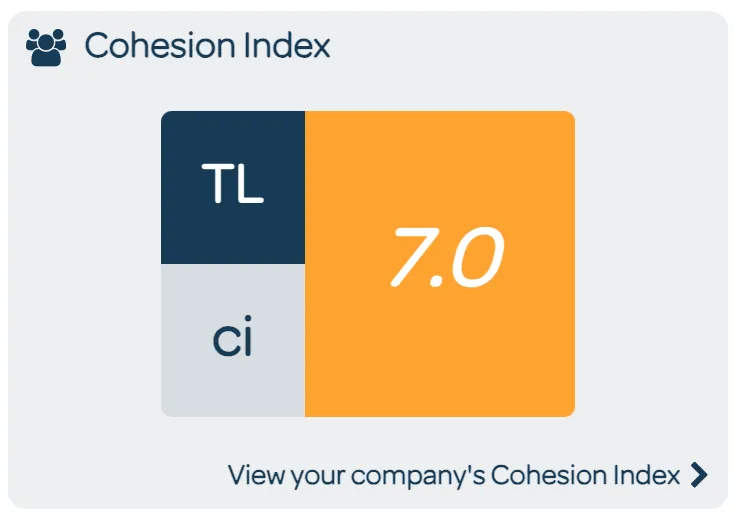
Team Cohesion
Team Cohesion
Your Teamlytica report gives you and your team a breakdown of each of the major nine categories within the report. All are colour-coded for ease of use.
The nine categories we score against are based around acknowledged academic, management and team diagnostics. Each question is carefully worded to ensure it can be answered by anyone completing the survey.
Each question is answered via a sliding scale of 1-10 – from ‘Never’ to ‘Always’. Each of the questions and categories are interlinked and inter-dependent and produce a clear and thorough diagnosis of where the team is ‘at’.
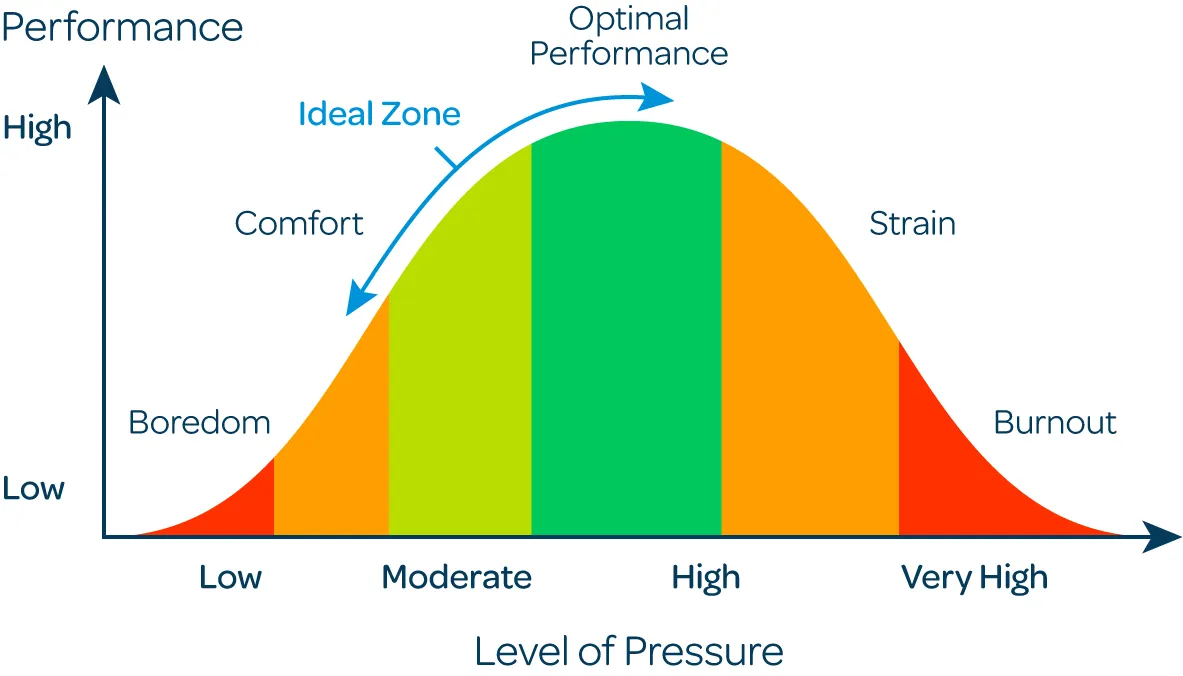
Team Stress Indicators
Team Stress Indicators
TeamLytica's stress curve analysis is a powerful tool for team leaders and members alike. By tracking the stress curve over time, teams can assess the effectiveness of their strategies for stress management and identify areas for improvement.
Understanding how stress impacts team dynamics allows for targeted interventions and the creation of a healthier and more resilient work environment.
Ultimately, by leveraging the stress curve, TeamLytica empowers teams to proactively manage stress, foster collaboration, and achieve their goals with greater efficiency and harmony.


Team Morale
Psychological safety is a fundamental aspect of high-performing teams, and at TeamLytica, we prioritise its understanding and cultivation. Psychological safety refers to an environment where team members feel safe to take risks, express their ideas, and be their authentic selves without fear of judgment or negative consequences.
It creates a space where individuals feel comfortable sharing their opinions, making mistakes, and seeking feedback. By fostering psychological safety within teams, TeamLytica helps unlock the full potential of each member, leading to increased collaboration, innovation, and overall team effectiveness.
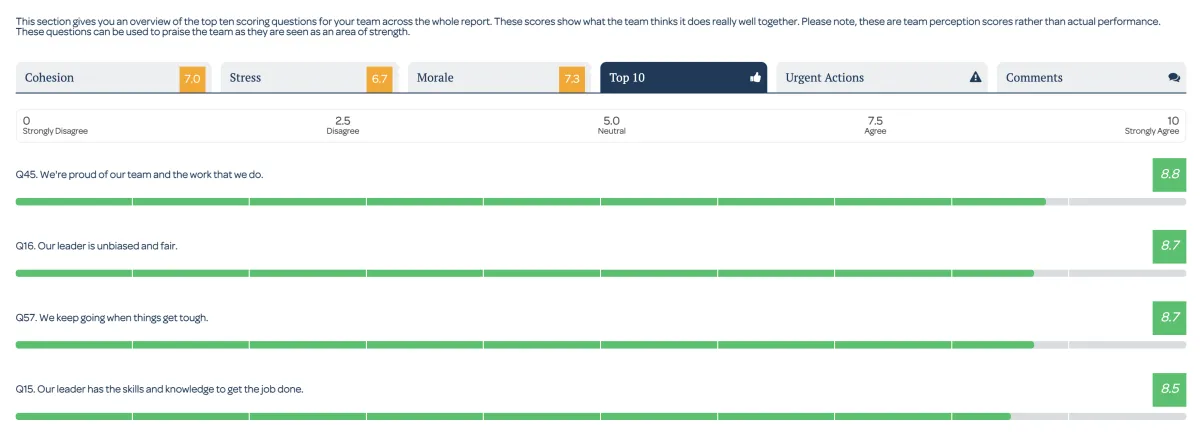
Top Ten Scores
Your Teamlytica report gives you and your team a breakdown of each of the major nine categories within the report. All are colour-coded for ease of use.
The nine categories we score against are based around acknowledged academic, management and team diagnostics. Each question is carefully worded to ensure it can be answered by anyone completing the survey.
Each question is answered via a sliding scale of 1-10 – from ‘Never’ to ‘Always’. Each of the questions and categories are interlinked and inter-dependent and produce a clear and thorough diagnosis of where the team is ‘at’.
Urgent Actions
Urgent Actions
TeamLytica's stress curve analysis is a powerful tool for team leaders and members alike. By tracking the stress curve over time, teams can assess the effectiveness of their strategies for stress management and identify areas for improvement.
Understanding how stress impacts team dynamics allows for targeted interventions and the creation of a healthier and more resilient work environment.
Ultimately, by leveraging the stress curve, TeamLytica empowers teams to proactively manage stress, foster collaboration, and achieve their goals with greater efficiency and harmony.
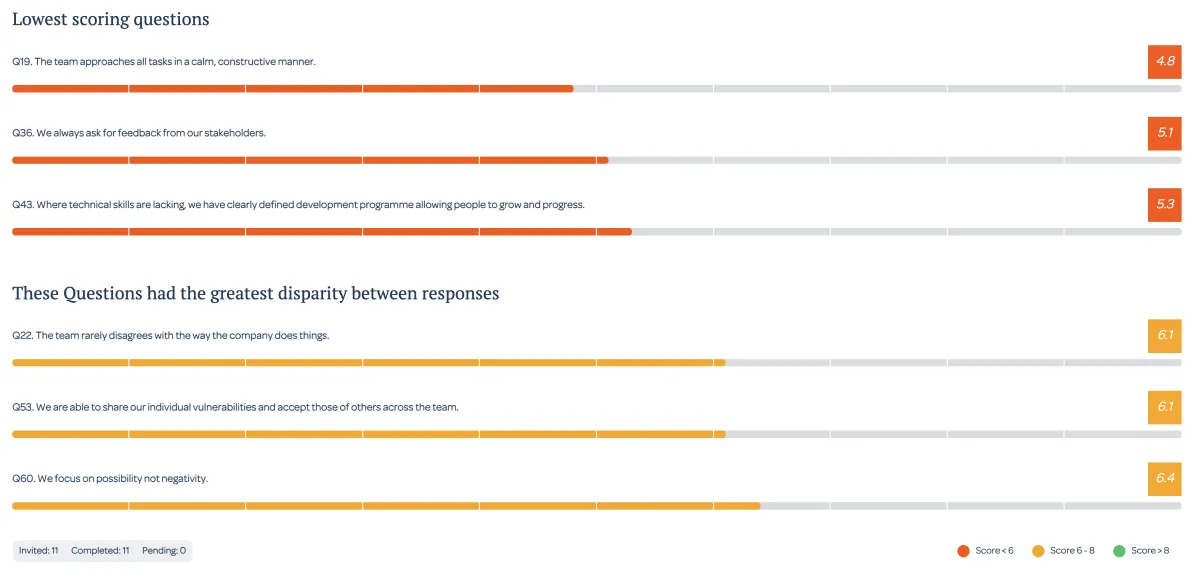
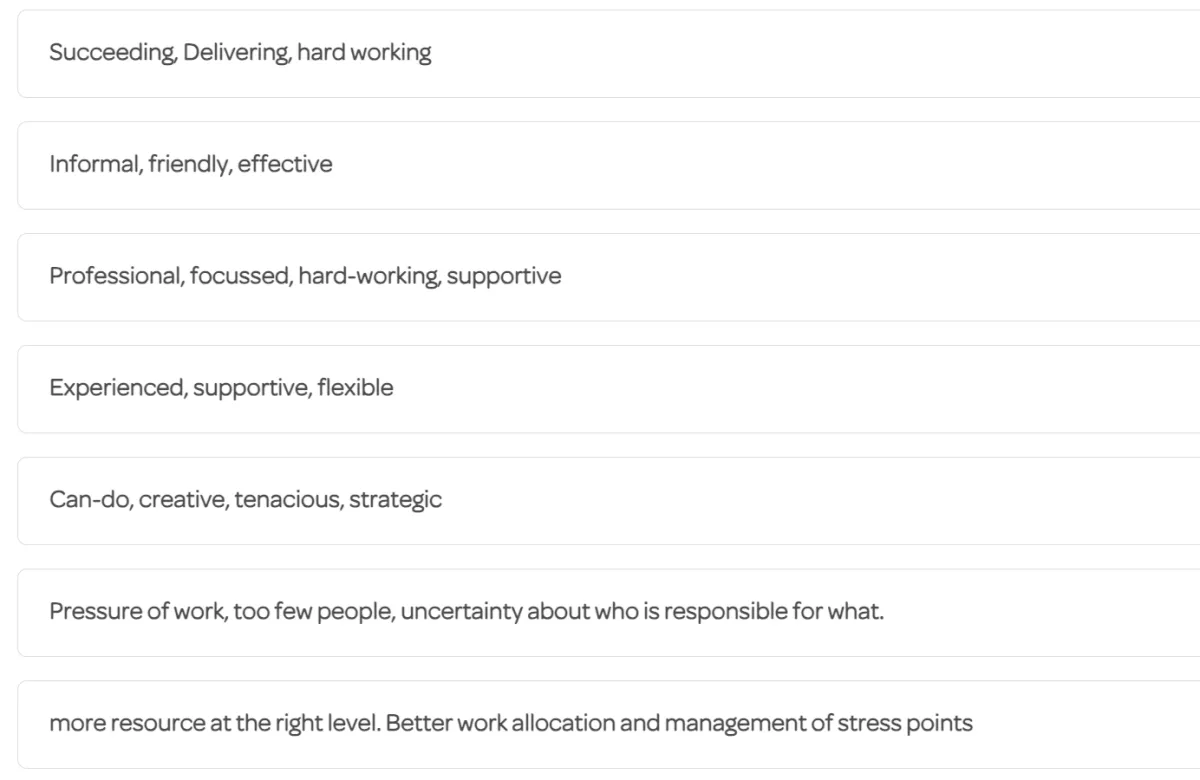
Open Text Responses
Your Teamlytica report gives you and your team a breakdown of each of the major nine categories within the report. All are colour-coded for ease of use.
The nine categories we score against are based around acknowledged academic, management and team diagnostics. Each question is carefully worded to ensure it can be answered by anyone completing the survey.
Each question is answered via a sliding scale of 1-10 – from ‘Never’ to ‘Always’. Each of the questions and categories are interlinked and inter-dependent and produce a clear and thorough diagnosis of where the team is ‘at’.
TeamLytica's Nine Categories
Our unique reporting system gathers information on the nine fundamental categories which are key to a happy, healthy team dynamic.
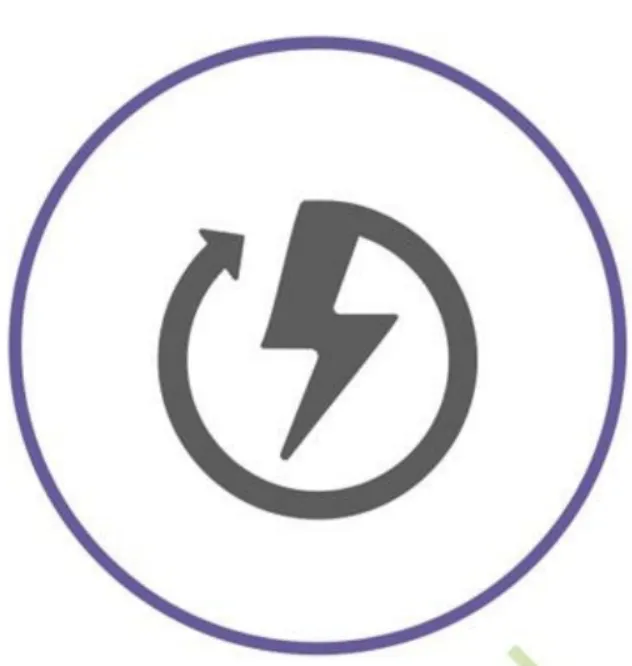
Energy
The Energy category focuses on assessing team members' motivation, enthusiasm, and engagement. It measures their passion for their work and ability to maintain high energy levels. By understanding and optimising team energy, organisations can foster productivity, creativity, and a positive work atmosphere.

Leadership
The Leadership category evaluates the effectiveness of team leaders in guiding and inspiring their members. It assesses leadership qualities, communication skills, decision-making abilities, and their impact on team performance. Effective leadership motivates team members, fosters growth, and contributes to a culture of success.

Capability
The Capability category assesses team members' skills, expertise, and knowledge. It evaluates their collective capabilities to accomplish tasks, solve problems, and meet objectives. By identifying areas for improvement and providing development opportunities, organisations can enhance their team's capabilities and achieve optimal performance.

Trust
Trust is a critical component of successful teamwork. The Trust category measures the level of trust and psychological safety within a team. It evaluates factors such as reliability, transparency, and accountability. By fostering trust, organisations create an environment where team members feel safe to take risks, express opinions, and collaborate effectively.
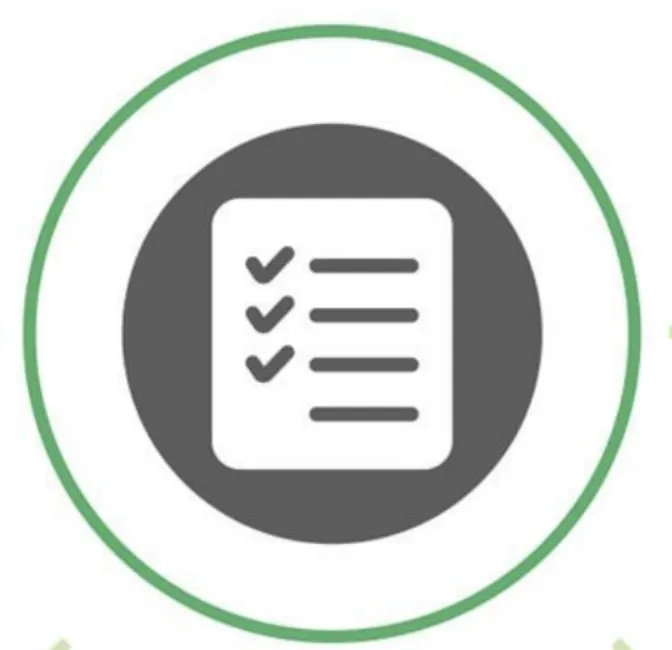
Delivery
The Delivery category assesses a team's ability to meet deadlines, deliver high-quality work, and fulfil commitments. It focuses on project management, efficiency, and consistent results. Organisations can optimise their delivery capabilities by identifying areas of improvement, streamlining processes, and ensuring successful outcomes.
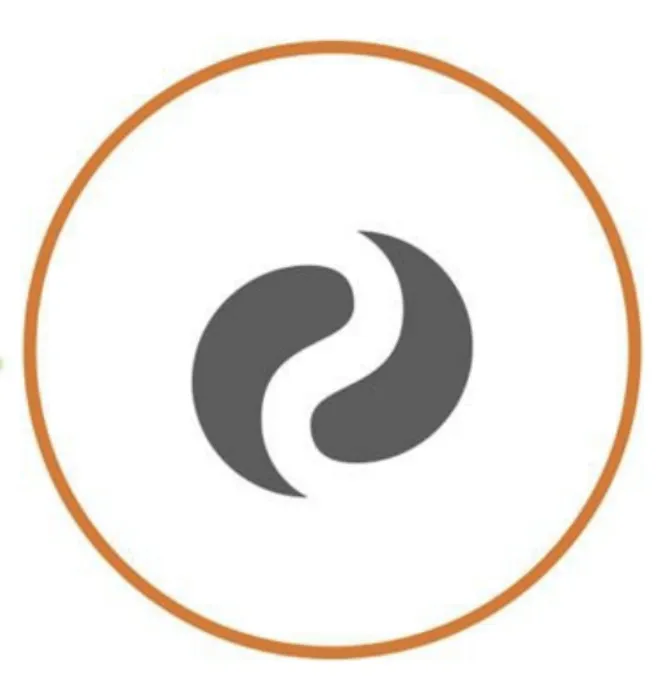
Harmony
The Harmony category evaluates a team's cooperation, communication, and synergy. It assesses how well team members work together, resolve conflicts, and maintain a positive team atmosphere. Organisations can foster collaboration and create a harmonious work environment by nurturing effective team dynamics and encouraging a supportive culture.
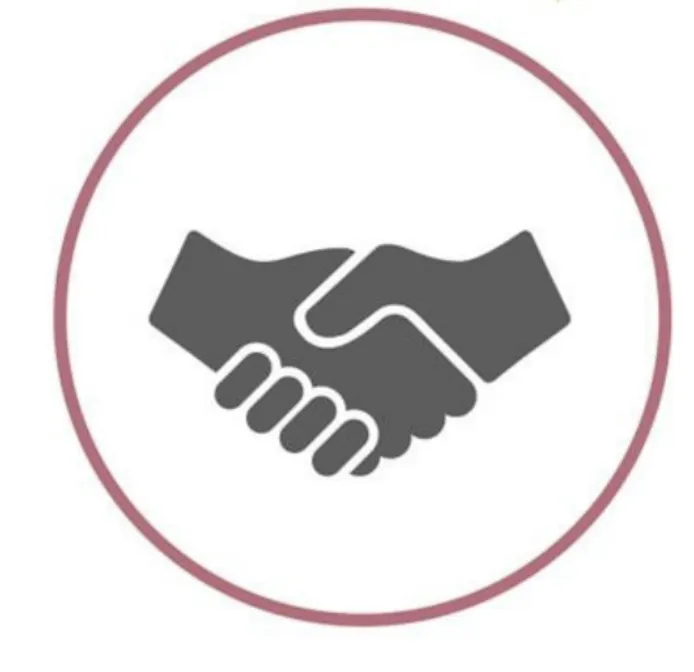
Stakeholders
The Stakeholders category assesses a team's relationship with external parties, such as clients, suppliers or partners. It evaluates how well the team understands stakeholder needs, manages expectations, and communicates effectively. Organisations can strengthen stakeholder relationships and drive success by aligning their efforts to meet these stakeholder requirements.

Accountability
The Accountability category evaluates how well team members take ownership of their responsibilities, meet commitments, and deliver on promises. It assesses personal and collective accountability within the team. Cultivating a culture of accountability fosters reliability, productivity, and overall team success.
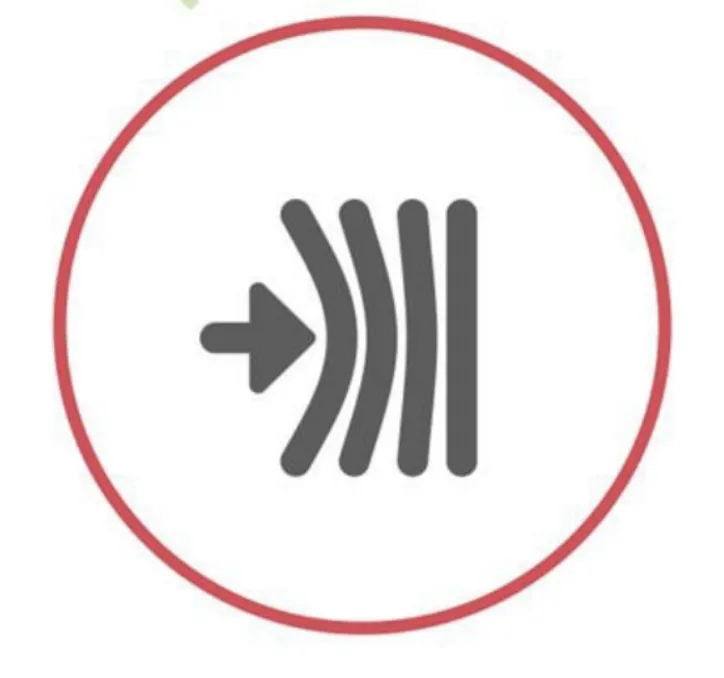
Resilience
Resilience refers to a team's ability to adapt, recover, and thrive in the face of challenges. The Resilience category evaluates how well teams cope with stress, embrace change, and overcome adversity. Organisations can enhance team resilience by providing support, promoting a growth mindset, and equipping teams with the tools to navigate obstacles
Would you like to see a TeamLytica report in action?
Enter your name and email address to receive your free Teamlytica sample report. We will deliver it directly to your Inbox.

Tyrelle Mcleod-Bentley
Director
Soccer Assist
The irony is not lost on us that we recruit and place the next generation of sports stars who all have to excel in teams. The Teamlytica platform has helped us get to a place where we're proud of our own team performances.

Anita Dev
Director
TeamWork ADL
The team reports have really helped our team and given our senior leaders the knowledge we've needed to make effective changes to the way we work and manage.

Steve Chown
Entrepreneurial Innovation Manager
TeamLytica's software has been identified as a valuable tool to check the effectiveness of newly combined teams in the Bank. We are using it to review their progress as the staff become more integrated.

Tyrelle Mcleod-Bentley
Director
Soccer Assist
The irony is not lost on us that we recruit and place the next generation of sports stars who all have to excel in teams. The Teamlytica platform has helped us get to a place where we're proud of our own team performances.

Anita Dev
Director
TeamWork ADL
The team reports have really helped our team and given our senior leaders the knowledge we've needed to make effective changes to the way we work and manage.

Steve Chown
Entrepreneurial Innovation Manager
TeamLytica's software has been identified as a valuable tool to check the effectiveness of newly combined teams in the Bank. We are using it to review their progress as the staff become more integrated.
Accredited Coaches
Only accredited coaches can use TeamLytica.
The training and support you get will ensure you have the right level of knowledge to be able to coach teams as well as individuals. Then our reporting platform gives you a strong structure, providing you with a foundation that you can build on with your own knowledge and experience.
Find out more about our solution:
Keep up to date with our
News & Blogs

Professional Services
Professional Services
Building better teams to deliver enhanced client projects and drive productivity and performance.
Professional service provision is becoming increasingly complex. Gone are the days where individual employees worked on client projects. The emphasis now is on bringing all of the skills of the team to bear on client issues.
Creating effective teams is, therefore, a top priority for firms operating in the professional services industry. They need leaders and managers who understand how to bring people together to deliver transformational change for their clients. Unhappy teams provide poor results and can lead to client dissatisfaction, reducing competitiveness and, ultimately, the viability of the enterprise.
K – Knowledge, I – Insights, T – Training, E – Empowerment.
TeamLytrica is a tool that managers in the professional services industry can use to identify problems in their teams and get actionable solutions. The KITE questionnaire, which stands for knowledge, insights, training and empowerment, is a confidential survey containing 54 questions across nine categories for team members. The platform then takes the responses of the team and uses them to generate a report that allows managers to quickly identify issues and put in place measures to solve them.
Management issues in the professional services environment are notoriously complex. Teams are often highly interdependent, relying ad hoc on the skills of others, as and when the situation warrants it. Managers, therefore, need to focus less on process and more on interpersonal relations than in practically any other line of business.
We aim to do things a little differently at TeamLytica – we’re here to help.
TeamLytica is a powerful tool that you can use to resolve interpersonal conflict and identify the roots of any problems in your team. The service includes a measure of trust, telling you how much your colleagues trust you and feel confident that you mean what you say. It also gives you a test of harmony – an indication of how happy team members are working with each other and management. If scores are low, the platform provides immediately actionable insights, allowing you to see where you’ve gone wrong and how you can improve.
Managers in the professional services industry face a range of unique challenges. First and foremost is the need to motivate teams to work together and support each other, even when things get tough. TeamLytica provides a detailed overview of resilience among your employees, showing you visually how well they’re coping with the demands placed on them by clients and the organisation.
Managers also face challenges in establishing group goals. Career-orientated personalities in the team might be tempted to act in their strategic interest instead of that of the group. TeamLytica provides detailed insights that help managers adopt leadership practices that bypass these temptations to build single-minded teams, focused on results that benefit the entire organisation.
For managers who oversee multiple locations, such as partners at a law firm, TeamLytica also offers tools that compare results from various sites. You’re able to drill down into the data to find out why some teams in your organisation are healthy and functional, while others aren’t. You can even import key performance indicators and correlate them with the results of the survey to generate more granular insights for management.
Use TeamLytica today to find out more about what makes teams effective in your organisation












